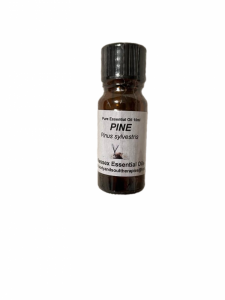Pine 10ml

£4.20
Product Description
Another oil that doesn't need much explanation very woody with a wintery scent.
Pine oil, also called pine nut oil, pine seed oil or pine needle oil, is derived from the needles of the Pinus sylvestris tree. Known for being cleansing, refreshing and invigorating, pine oil has a strong, dry, woodsy smell — some even say it resembles the scent of forests and balsamic vinegar.
With a long and interesting history that stems back to use in ancient Greek civilizations, including by Hippocrates himself, pine oil is an age-old therapeutic method for cleansing, reducing pain, increasing energy and relieving stress.
Pinus sylvestris trees have been a very important timber tree in Romania for centuries, and their dried bark often accumulates as waste from wood processing. Luckily through steam distillation, pine essential oil can be created even from dead, fallen pine bark.
Once bottled, this concentrated formula holds powerful active constituents that lower disease-causing inflammation, lift your mood through aromatherapy, as well as kill bacteria, fungi, yeast and pathogens. Proven to have the capability to purify air by helping eliminate various toxins that can live within your home, pine oil is beneficial as an asthma natural remedy, a cough remedy, and can even help alleviate allergies, respiratory infections and colds.
It’s also been studied for its strong anti-inflammatory and antioxidant constituents that can help battle cancer development and protect vital organs, including the brain, heart, liver and gut.
What Is Pine Essential Oil?
Pine trees are a sustainable crop and widely grown in cold climate areas throughout the world. In fact, unlike many other essential oil plants, pine trees are durable and resistant to weather changes since they can withstand temperatures as low as minus 40 degrees!
Historically, mattresses were said to be stuffed with the needles of the pine tree to help repel lice and fleas. The ancient Egyptians also supposedly used pine kernels in their cooking to kill food bacteria and decrease contamination.
Known for being a fresh-smelling ingredient in many household cleaners, pine essential oil can do more than freshen up your home — it also has the ability to remove potentially dangerous fungi, bacteria, molds and yeast.
As considerable interest has been given to natural plant extracts that have great use for the improvement of air quality without the need for harsh chemicals, pine nut extract has been one essential oil to rise to the top. Pine oil has been well-researched for its abilities to purify poor indoor air quality, which largely depends on the chemical composition of microorganisms living in the air that lead to pollution, odors, germ-spreading and contamination.
Some species of fungi and bacteria living in the air (such as Aspergillus flavus, A. fumigatus, A. niger and others) and their toxins cause difficulty in breathing, allergic rhinitis, watery eyes, headaches and flu-like symptoms. In 2004, when researchers from Vilnius Pedagogical University in Lithuania investigated the purifying biological activity of Pinus sylvestris L. extract in order to find out its fungicidal benefits against airborne microorganisms, they found positive results.
Pine oil, also called pine nut oil, pine seed oil or pine needle oil, is derived from the needles of the Pinus sylvestris tree. Known for being cleansing, refreshing and invigorating, pine oil has a strong, dry, woodsy smell — some even say it resembles the scent of forests and balsamic vinegar.
With a long and interesting history that stems back to use in ancient Greek civilizations, including by Hippocrates himself, pine oil is an age-old therapeutic method for cleansing, reducing pain, increasing energy and relieving stress.
Pinus sylvestris trees have been a very important timber tree in Romania for centuries, and their dried bark often accumulates as waste from wood processing. Luckily through steam distillation, pine essential oil can be created even from dead, fallen pine bark.
Once bottled, this concentrated formula holds powerful active constituents that lower disease-causing inflammation, lift your mood through aromatherapy, as well as kill bacteria, fungi, yeast and pathogens. Proven to have the capability to purify air by helping eliminate various toxins that can live within your home, pine oil is beneficial as an asthma natural remedy, a cough remedy, and can even help alleviate allergies, respiratory infections and colds.
It’s also been studied for its strong anti-inflammatory and antioxidant constituents that can help battle cancer development and protect vital organs, including the brain, heart, liver and gut.
What Is Pine Essential Oil?
Pine trees are a sustainable crop and widely grown in cold climate areas throughout the world. In fact, unlike many other essential oil plants, pine trees are durable and resistant to weather changes since they can withstand temperatures as low as minus 40 degrees!
Historically, mattresses were said to be stuffed with the needles of the pine tree to help repel lice and fleas. The ancient Egyptians also supposedly used pine kernels in their cooking to kill food bacteria and decrease contamination.
Known for being a fresh-smelling ingredient in many household cleaners, pine essential oil can do more than freshen up your home — it also has the ability to remove potentially dangerous fungi, bacteria, molds and yeast.
As considerable interest has been given to natural plant extracts that have great use for the improvement of air quality without the need for harsh chemicals, pine nut extract has been one essential oil to rise to the top. Pine oil has been well-researched for its abilities to purify poor indoor air quality, which largely depends on the chemical composition of microorganisms living in the air that lead to pollution, odors, germ-spreading and contamination.
Some species of fungi and bacteria living in the air (such as Aspergillus flavus, A. fumigatus, A. niger and others) and their toxins cause difficulty in breathing, allergic rhinitis, watery eyes, headaches and flu-like symptoms. In 2004, when researchers from Vilnius Pedagogical University in Lithuania investigated the purifying biological activity of Pinus sylvestris L. extract in order to find out its fungicidal benefits against airborne microorganisms, they found positive results.



